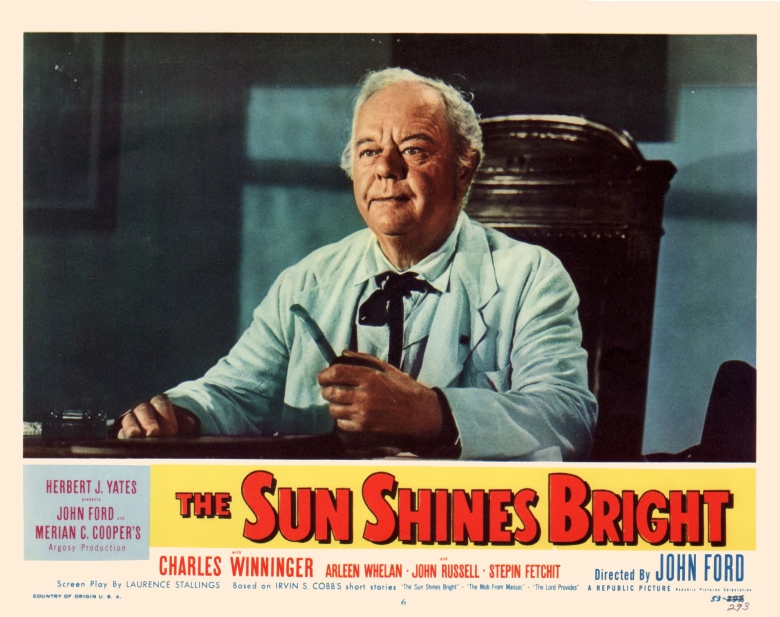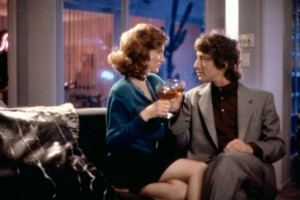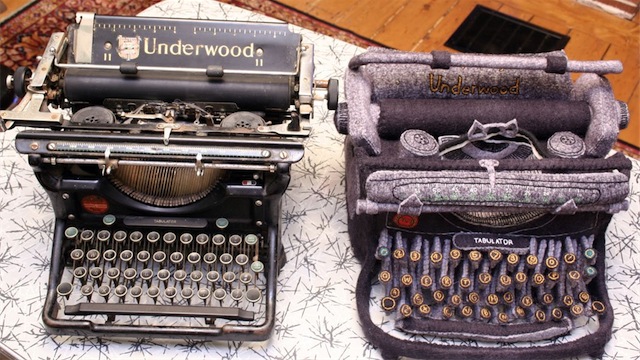This was originally published by the Viennale in 2004 as part of a catalogue (Die Früchte des Zorns und der Zärtlichkeit) accompanying a program of John Ford films selected by Jean-Marie Straub and Danièle Huillet; it subsequently appeared online in Rouge no. 7 (2005). One can also access Kevin Lee’s two-part video featuring my commentary on both The Sun Shines Bright and Gertrud here and here. — J.R.

“The Doddering Relics of a Lost Cause”: John Ford’s The Sun Shines Bright
by Jonathan Rosenbaum
My father helped to run a small chain of movie theaters in northwestern Alabama that were owned by my grandfather while I was growing up. He and my mother weren’t cinephiles, but on two separate occasions they took the trouble to travel to cities in different states to attend world premieres in the South while I was growing up. One was for a big Southern film from a big studio (M-G-M), Gone with the Wind, held in 1939 in Atlanta. The other was for a small Southern film from a small studio (Republic Pictures), The Sun Shines Bright, held in 1953 in what I believe was a city in Tennessee — most likely Nashville or Chattanooga, possibly Memphis or Knoxville. Read more
From the Chicago Reader (November 20, 1987). — J.R.

CROSS MY HEART
*** (A must-see)
Directed by Armyan Bernstein
Written by Armyan Bernstein and Gail Parent
With Martin Short, Annette O’Toole, Paul Reiser, and Joanna Kerns.

Like a 3-D movie, in which the illusion of depth is utterly dependent on the spectator’s rigidly foursquare frontal viewing position, Armyan Bernstein’s Cross My Heart is flat and fuzzy around the edges; tilt your head slightly, and the roundness of the characters vanishes immediately. But because the characters holding the center of the screen are nearly always Martin Short and Annette O’Toole — consummate pros commanding and regulating the space between and around them like two generals at a summit conference — there’s rarely any reason to look aside; our attention is riveted.
For all their charisma, one wouldn’t have thought O’Toole or Short capable of such mastery on the basis of their separate and earlier outings. Despite his frequent brilliance on SCTV and Saturday Night Live, mainly as a parodist of narcissistic TV and movie personalities ranging from Dick Cavett to Jerry Lewis (by way of Katharine Hepburn), Short was both literally and figuratively dwarfed by Steve Martin and Chevy Chase in Three Amigos, although admittedly all three amigos were mainly stranded by the anemic comic material. Read more
From the Chicago Reader (January 17, 1992). — J.R.

NAKED LUNCH **** (Masterpiece)
Directed and written by David Cronenberg
With Peter Weller, Judy Davis, Ian Holm, Julian Sands, Roy Scheider, Monique Mercure, Michael Zelniker, and Nicholas Campbell.
And some of us are on Different Kicks and that’s a thing out in the open the way I like to see what I eat and vice versa mutatis mutandis as the case may be. Bill’s Naked Lunch Room . . . Step right up. Good for young and old, man and bestial. Nothing like a little snake oil to grease the wheels and get a show on the track Jack. Which side are you on? Fro-Zen Hydraulic? Or you want to take a look around with Honest Bill?” — William S. Burroughs, introduction to Naked Lunch (1962)
The first time I read William S. Burroughs’s Naked Lunch—or at least large portions of it — was in 1959, a few months after its first printing, in a smuggled copy of the seedy Olympia Press edition fresh from Paris. As I recall it was missing most or all of the accompanying matter — the introduction (“Deposition: Testimony Concerning a Sickness”), “Atrophied Preface” (“Wouldn’t You?”), Read more




